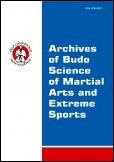2017, Volume 13, Issue 1
Changes in muscle stiffness as the effect of karate tournament fight
Andrzej Zarzycki1, Kazimierz Witkowski2, Beata Pożarowszczyk3, Martyna Kumorek3, Aleksandra Kisilewicz3, Małgorzata Smoter4, Łukasz Korpal3, Paweł Piepiora2, Adam Kawczyński3
1Wrocław University of Environmental and Life Sciences, Wrocław University of Environmental and Life Sciences, Wrocław, Poland
2Department of Sport Didactics, University School of Physical Education, Wrocław, Poland
3Department of Paralympics Sports, University School of Physical Education, Wrocław, Poland
4Department of Biostructure, University School of Physical Education, Wrocław, Poland
Author for correspondence: Adam Kawczyński; Department of Paralympics Sports, University School of Physical Education, Wrocław, Poland; email: kawczynski.a[at]gmail.com
Full text
Abstract
Background & Study Aim: There is a number of research proving decrease of stiffness after different types of intensive aerobic exercise, such as marathon or triathlon. On the contrary, other authors confirmed that the stiffness increase, as a result of eccentric contractions related to the delayed onset of muscle soreness. To the best of our knowledge, no study has addressed the efficacy of karate fights on muscle stiffness, assessed by myotonometry. We hypothesised that a decrease in upper trapezius muscle stiffness among karate competitors in response to series of karate tournament fights.
Material & Methods: In part A (reliability of study), 15 right-handed non-trained males subjects (aged 20.7 ±1.2 years; height 174.6 ±6.1 cm; body mass 73.2 ±10.6 kg) volunteered to participate. In part B (experimental) 15 male karate competitors (age 24.7±4.5 years; height, 176.4 ±65.8 cm; weight, 72.3 ±5.4 kg;) volunteered to participate. We conducted a study composed of two measurements of upper trapezius muscle stiffness, directly before and immediately after tournament karate fight. The muscle stiffness was assessed by using myotonometric measurements with the MyotonPRO device.
Results: Upper trapezius muscle stiffness in muscle belly sites decreased significantly from before fight (341.2 ±31.2 N/m) to after fight (302.3 ±34.7 N/m) (p = 0.02).
Conclusions: Two-minutes karate fight caused a significant decrease in muscle stiffness. Our findings could be an important asset for a trainer or other researchers investigating exercise-related changes in muscle stiffness.
Key words: muscle viscoelastic properties, muscle diagnostics, martial arts, anaerobic exercise, trapezius muscle





